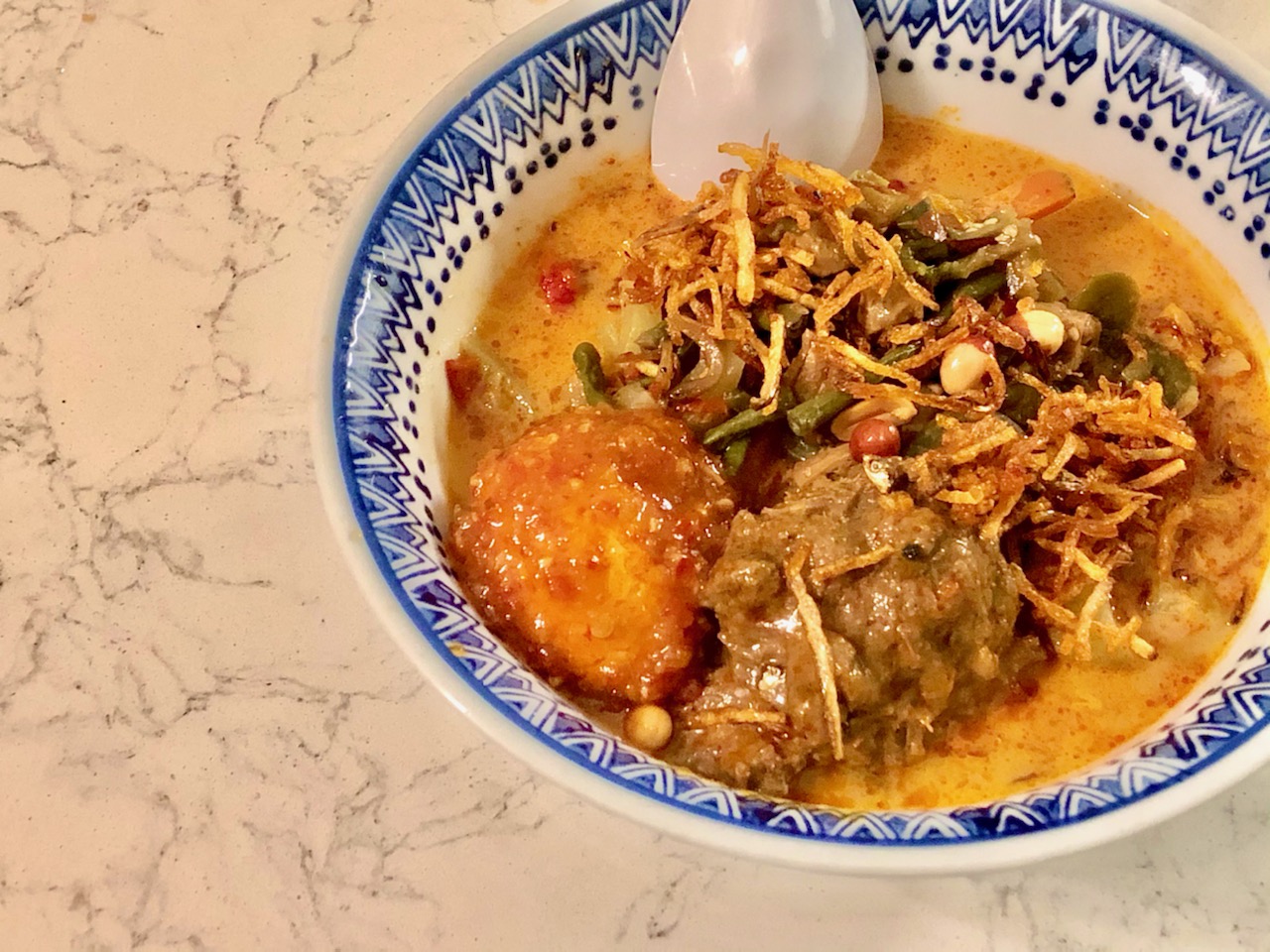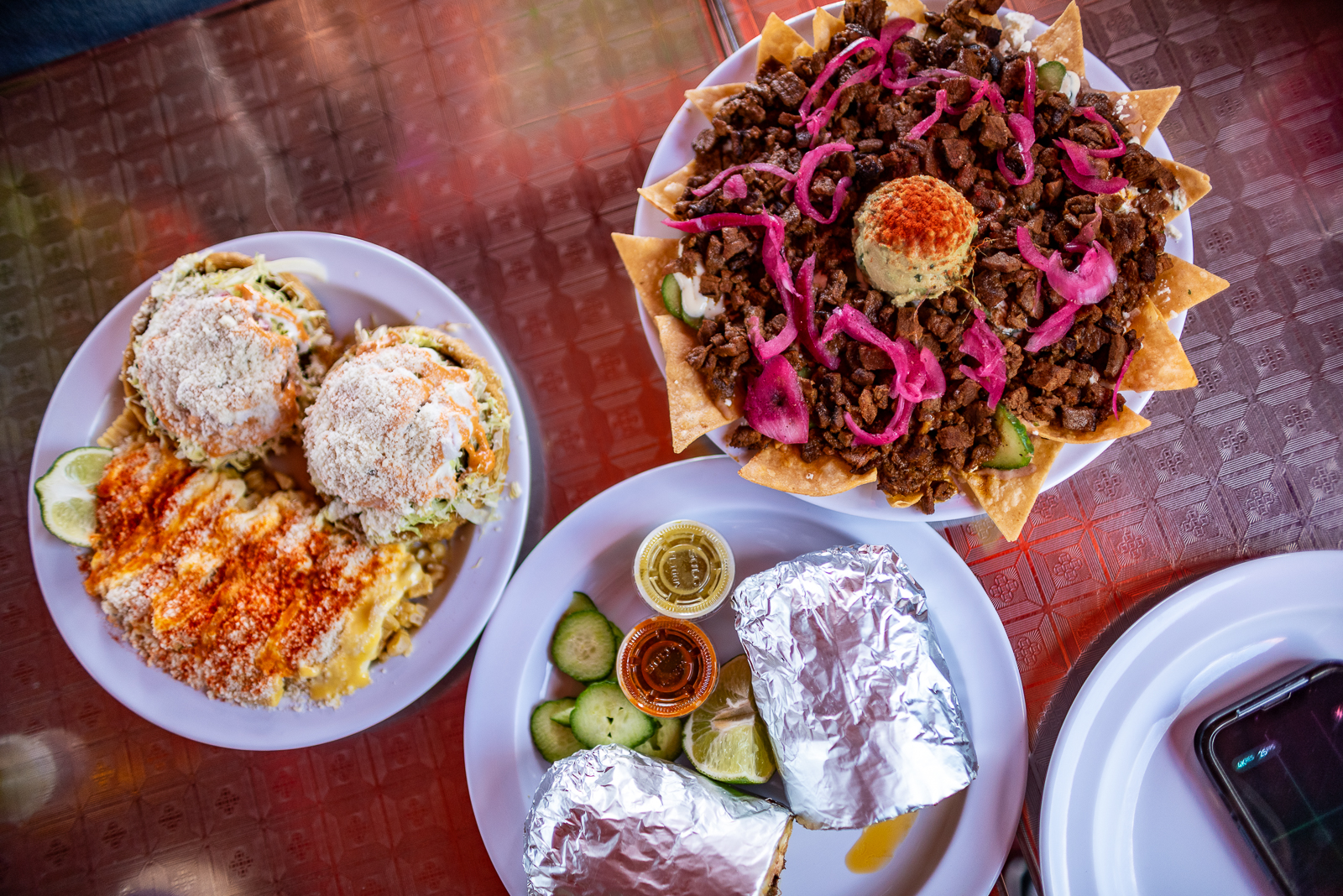When the Great Pandemic engulfed the world as we know it, the most vulnerable of our population, the elderly, had to be extra-cautious in keeping the virus at bay. As a result, many of us became hyper-vigilant about protecting older relatives like grandparents. It was no different for Siu Chen, matriarch to two adult daughters, sons-in-law, and grandchildren. Chen, who is 76, was always active in the San Gabriel Valley Indonesian community since immigrating to the U.S. in 1997 from her native country of Indonesia. That is until COVID had her seeking shelter along with everyone else back in early 2020, forcing her to temporarily close her Indonesian food catering business that she ran from her house.
However, Chen is no ordinary 76-year-old grandma. As anyone who knows her will tell you, she lives to cook, and she had bigger plans than to re-open her home-based business. It wouldn’t be long for her return, but she had to lay low in the meantime.
What kept her busiest pre-pandemic was cooking meals for her church in Monterey Park and fulfilling large catering orders of her homestyle cooking reminiscent of the soulful snacks and dishes available throughout Indonesia. A typical scene in her tiny home kitchen involved catering pans brimming with turmeric rice, tofu tempeh in green chile, fried chicken, beef rendang, and spicy potatoes–the wafting fragrances transporting anyone who grew up with this comfort cuisine right back to their bustling Jakarta neighborhood, the fantastic floating market in Bandung, or even a mother’s homemade dinner in Medan, like the fare Chen’s own mother cooked for her when she grew up in the North Sumatran capital as a child.
“She makes food from all over Indonesia: Jakarta, Padang, Java,” translated Chen’s son-in-law and shop manager Johan Arifin. “Not only Medan food,” added Chen in her native tongue.

When Chen eventually launched her food store in July 2020, after months of Netflixing and Facebooking in isolation, she stayed true to her roots. She named it Medan Kitchen as an homage to her mother’s humble street cart long ago that peddled fried rice noodles and other items.
“I couldn’t stand to watch any more Netflix,” said Chen. “I was 75 when I decided. It was now or never.”
With a new sense of urgency, she recruited her family to help transform her out-of-home catering business, which was unceremoniously unplugged when the pandemic hit, into a food store. Luckily for Chen, restaurant space was plenty as the pandemic wreaked havoc and shut down vulnerable, traditional eat-in-only establishments. The family quickly snapped up a vacancy located in a hidden-away strip of a shopping center on Valley Boulevard.
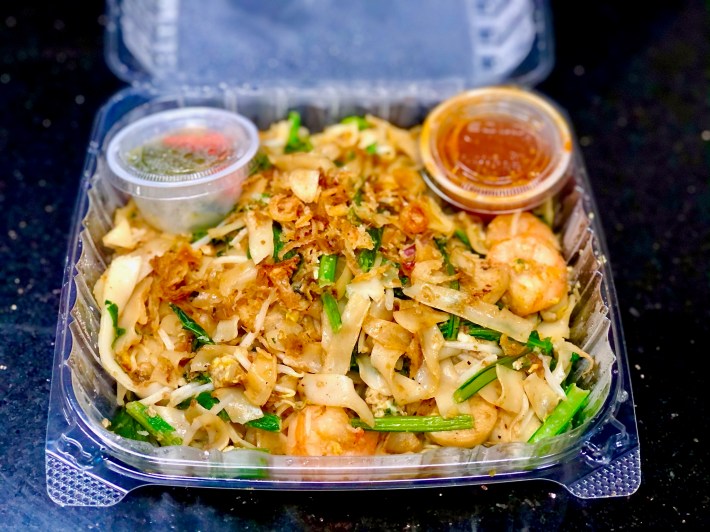
Chen was back as a chef, with an official storefront. Word got out quickly, and the support from the community was staggering. While many small, family-run restaurants were casualties of shelter-in-place orders, mandating them to shutter as non-essential businesses, Medan Kitchen was classified as a grocery store and takeout, allowing its doors to remain open. More vital still was the pent-up demand from her church, catering customers, and the Indonesian community that came in droves to practically clean out the shop’s prepared food offerings daily.
“We sell out most of the items made by Siu (Chen) every day,” said Arifin.
“Auntie,” as some customers call the petite Chen, whose joyous, laughing caricature is emblazoned on the door, is a vital culinary connection to her community’s homeland wherever that may be in Indonesia. You’ll notice the extensive list of rotating offerings that attempt to cover such vast culinary terrain. Almost every day, Chen’s daughter Susi posts on Medan Kitchen’s Instagram account announcing a dizzying selection of delights like kwetiau goreng (a fried flat rice noodles with Chinese origin), rujak (fruit salad with a spicy-sweet sauce originating from Java), or, perhaps, lontong sayur (a Medan rice cake with veggies in coconut milk soup). It’s estimated that Chen cooks large quantities of 30 to 50 different dishes to satisfy demand each day of business (Thursday through Sunday).
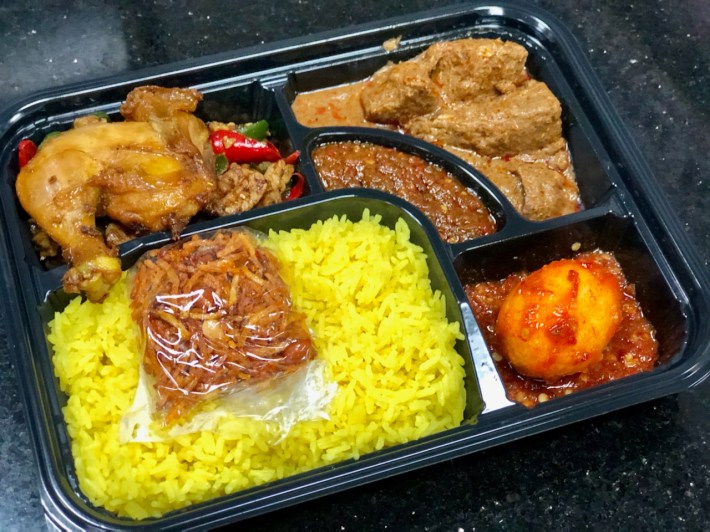
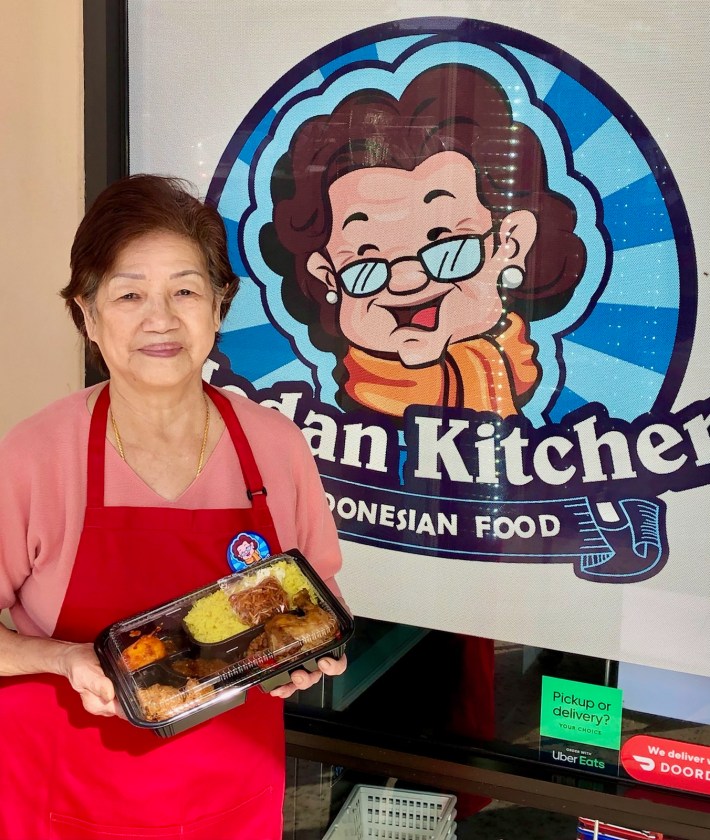
She also creates desserts ranging from the popular es cendol or iced green jelly to kolak biji salak made with rare snake fruit seeds.
“I love cooking. I see people coming to buy food, I am happy. Customers are like my family,” said Chen. When something isn’t on the IG menu, she’ll take requests. Just give her about a week's heads up.
Frequently, the kinds of food you’d see for sale at Medan Kitchen may also be what you’d come across while meandering through Medan. Warungs or small family businesses line the avenues selling all manner of meals from steaming bowls of kari bihun (curry rice noodles) to the crowd favorite nasi bungkus, which is a way of serving a variety of takeaway items rather than being a specific dish. Nasi bungkus is centered around a pyramid of rice that customers surround with many things like beef rendang or spicy boiled/fried egg. The food is then folded within a banana leaf (a fragrant, eco-friendly to-go box). These casual, family-run food shops aren’t necessarily restaurants because all of the food is pre-packaged, grab-and-go, ready to eat. Much of the food can be consumed at room temp. This model is how Medan Kitchen operates.
One of Medan Kitchen’s most popular items is nasi bungkus. The shop’s version contains Chen’s pre-selected items, then wrapped in banana leaf. At a traditional restaurant, you’d choose your own items from what’s offered. The prepackaged version is safer and more sanitary for COVID times.
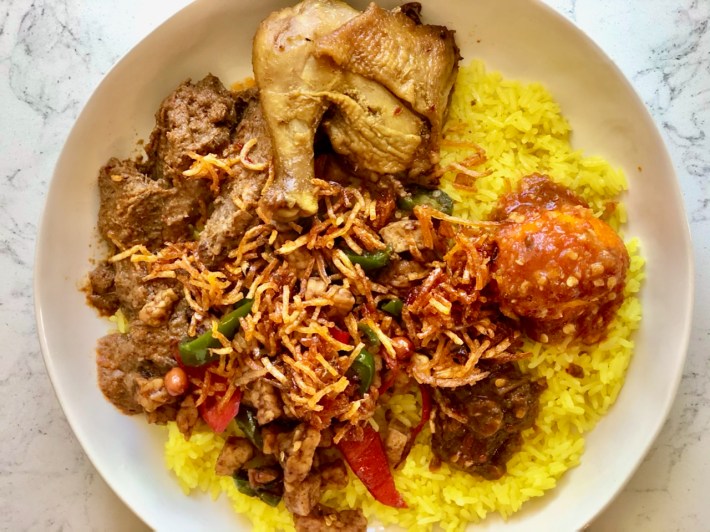
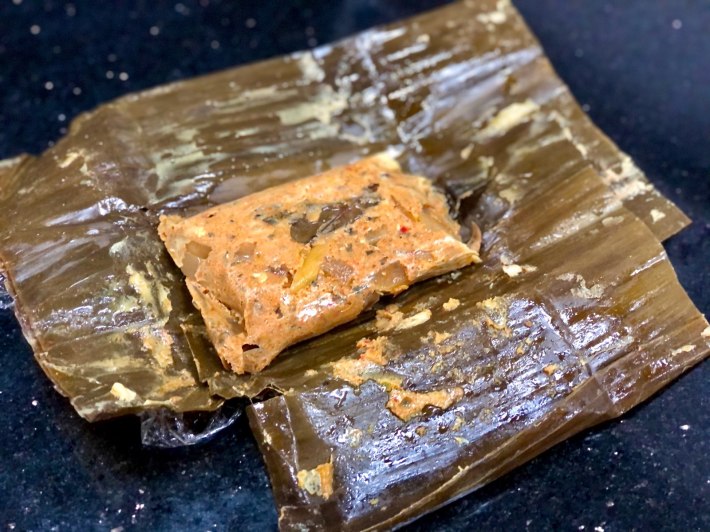
Counterintuitively, opening Medan Kitchen during a pandemic was perfect timing. As Arifin explained, “It was a good time to open because our concept is to-go, and people like that.”
But, if you just can’t wait to strip the banana leaf off of your nasi bungkus and sink into the succulent and saucy beef rendang that’s been braised to full delicious potential with its spicy-coconut-curry juices dripping into every crevice of the turmeric and coconut rice mound underneath, then have at it. Available is an optional outdoor dining section. Plus, there’s a lot more food inside that banana leaf, so grab a seat. (And they’ll happily heat up your food too.)
Upon further browsing, you’ll likely notice more than a few tamal-looking treats, but instead of corn husks, they’re swaddled in banana leaves. Arem-arem is a fragrant tubular dish made of coconut rice filled with vegetables and chicken. Also, the snack-sized lemper ayam, a banana leaf sealed chunk of glutinous rice filled with finely shredded, seasoned chicken, brings smiles to those familiar.
Then there’s pepes ikan teri, which is a unique delicacy of pureed anchovy, lemongrass, and other ingredients that have been steamed and shaped inside a banana leaf resulting in a blend of harmonious Indonesian flavors in an easy-to-eat package. There are different forms of pepe using ingredients like tofu or various seafood. You may even spot a zongzi, aka Chinese tamal, implanted with chicken or pork. Banana leaves are a big deal for Indonesian cooking because they are plentiful, biodegradable packaging, and infuse irresistible fragrance and flavor into the food.
Can you see it? A table spilling over with tamales, zongzi, pepe, arem-arem, and lemper might be just the thing we need this holiday season to truly express our gratitude for living in a city that gives us access to so much culinary diversity and deliciousness; to live and eat in L.A.
Medan Kitchen
8518 Valley Blvd.
Ste. 102
Rosemead, CA
626-693-6231
Open Thursday through Sunday
10:30 AM to 4 PM
Follow Medan Kitchen on Instagram.
